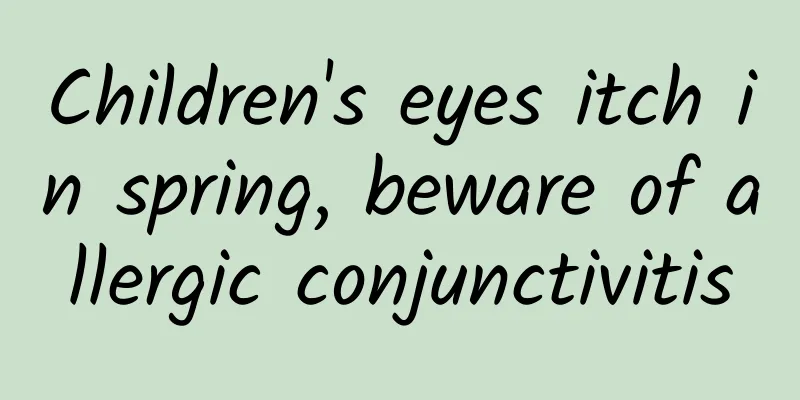Children's eyes itch in spring, beware of allergic conjunctivitis

|
□ Tao Hai In spring, everything comes back to life and flowers bloom. It is a time for people to go outing and enjoy the flowers. However, many people experience itchy and red eyes after going outing. Some people will experience these symptoms as soon as spring comes even if they stay at home. During the consultation process, patients often ask doctors questions like: Why do my eyes itch in spring? How to prevent and treat it? In fact, most of these people suffer from allergic conjunctivitis, a common eye disease. These patients often show symptoms of onset in spring and summer, and the symptoms improve or disappear in autumn and winter. Allergic conjunctivitis is usually caused by allergens in the air, which may be pollen, dust mites, dust, animal dander, etc. Allergic conjunctivitis is also related to personal constitution. Allergic conjunctivitis is an allergic reaction that is not contagious and has a certain degree of self-limitation. Since multiple people may have allergies in the same family or work environment, it is often mistaken for being caused by infection. In fact, it is mainly because everyone is in the same environment and is exposed to allergens, causing the same allergic conjunctivitis reaction. Allergic conjunctivitis is common in children and adolescents, and affects both eyes. The patient has a layer of pink, irregularly shaped flat protrusions on the inside of the upper eyelid, which looks like paving stones. The symptoms are itchy eyes, redness and congestion of the whites of the eyes, tears, and mucous milky white secretions. In addition, some patients have similar symptoms all year round, with a peak in spring and summer, and symptoms alleviated in other seasons. In general, the symptoms of allergic conjunctivitis can be relieved or disappear on their own with the change of seasons, and after repeated attacks for several years, the symptoms tend to alleviate or subside. For the treatment of allergic conjunctivitis, first of all, patients should try to identify the allergic substances, avoid contact with allergens in life, and cooperate with drug treatment, the effect is generally good. Some patients find it difficult to determine the allergic substances, so doctors' treatment of this disease is limited to relieving symptoms and alleviating patients' pain, and the treatment effect is generally not satisfactory. At present, there are several types of eye drops and representative drugs for the treatment of allergic conjunctivitis. The first is antihistamine eye drops: such as emedastine fumarate eye drops, etc.; the second is mast cell stabilizer eye drops: such as sodium cromolyn, pemirolast potassium and other eye drops; the third is dual-effect drug eye drops: such as olopatadine eye drops, etc.; the fourth is non-steroidal anti-inflammatory eye drops: such as diclofenac eye drops, etc.; the fifth is glucocorticoid eye drops: such as cortisone acetate, dexamethasone and other eye drops. It should be noted that although corticosteroids can effectively control allergic symptoms in the short term and have good effects, they should not be used for a long time and in large quantities, because these drugs may cause increased intraocular pressure, secondary glaucoma, cataracts and optic nerve damage, etc. It is recommended to use them according to the doctor's advice and not to use them at will. Some patients whose symptoms are particularly severe and who have not been cured after years of treatment may also consider "relocation therapy", that is, moving from the original area where they lived to another more distant area to live and work. This may achieve better results because they have moved to a different place and are away from the allergens in the original place of residence. (The author is the chief physician of the Department of Ophthalmology, PLA General Hospital) |
<<: No gastrointestinal symptoms means no illness? Screening as early as possible depends on it...
>>: Is low back pain caused by kidney deficiency? Here is the answer!
Recommend
What are the benefits of drinking sugarcane juice regularly? Does eating sugarcane cause internal heat or internal heat?
Winter has quietly come to us. As the climate wil...
How to relieve the symptoms of breast hyperplasia
The most important feature of a woman is her brea...
Can I eat Zhi in early pregnancy?
In summer, especially in the quiet night, you can...
[Popular Science] Ten pieces of hard knowledge on myopia prevention and control, parents must read!
Eyes are the windows to the soul and the most pre...
How to lighten the areola and solve your problems
Some women have very dark areolas. The normal are...
What should I do if my accessory breasts become swollen? These methods must be effective
If accessory breasts and milk swelling occur, wom...
What color is a girl's first menstrual period?
For adolescent girls, menstruation is a big deal....
Purpose of endometrial biopsy
In fact, the technology of endometrial biopsy is ...
What is the reason for white stuff in the vagina?
For women, they all hope to have a healthy body. ...
Can I eat Nepeta during early pregnancy?
Women need to pay attention to many things after ...
I had abdominal pain on the third day after the transplant.
As IVF technology matures, more and more couples ...
30-day confinement meal recipes and methods for normal childbirth
There is an old Chinese saying that you need to s...
What is the reason for the spots on the face of a 40-year-old woman
What causes spots on the face of a 40-year-old wo...
Vulvar itching after abortion
Abortion is a procedure to terminate a pregnancy ...
What is the difference between the WIFI version of the tablet and the full network version? The difference between a tablet and a laptop
Although both tablets and laptops are portable, t...









